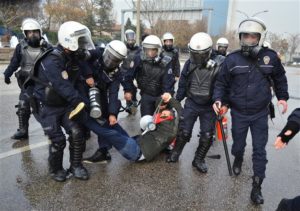With the media focusing on Erdogan’s April referendum, it is easy to lose sight of, or cover up, the tensions and serious abuses in the Kurdish areas in the south-east of the country.
By Lutz Oette. Published 3-25-2017 by openDemocracy

Photo: Conspiracies
The Turkish government’s response to the 2016 coup attempt is well known. In the name of national security, it has pursued a concerted campaign to crack down on the media, academics, the independence of institutions, human rights defenders and political opponents.
According to Erdogan’s critics, we are witnessing a barely veiled attempt to establish a new sultanate. The speed and magnitude of measures taken is dazzling. With the media focusing on Erdogan’s April referendum, it is easy to lose sight of, or cover up, the tensions and serious abuses in the Kurdish areas in the south-east of the country.
The ongoing campaign in the region once again bears the hallmarks of military and security rule. It turns the Kurdish population into ‘the enemy’, to the extent that even health professionals stand accused of belonging to a terrorist organisation by virtue of having provided treatment to ‘members of a terrorist organisation’.
Dr. Serdar Küni is such a health professional. A respected member of the local community, and former chairperson of the Şırnak Medical Chamber, his mission was to provide free and adequate health services to everyone without distinction. He treated survivors of abuses and human rights violations, including torture, and acted as local representative of the renowned Human Rights Foundation of Turkey.
His crime? Doing his job in the most difficult of circumstances when Turkish military forces waged a military campaign in Cizre after the summer of 2015.
In October 2016, Dr. Küni was arrested and remanded in prison for five months. His recent trial on 13 March was widely seen as a test case for the independence of the judiciary and respect for the work of health professionals. Dozens of health professionals, lawyers and human rights defenders from various parts of Turkey were in attendance. So were international observers from Germany, Norway, Sweden, the UK and the US who had travelled past several military checkpoints and visible reminders of destruction to the Şırnak Heavy Court.
The story of the hearing is straightforward and disturbing in equal measure. The prosecution’s case rested on the statements of four witnesses who had implicated Dr. Küni. One witness after the other came forward to state that he had been tortured to sign a statement that the accused had provided treatment to militants and hid them from the authorities.
Dr. Küni had been framed in what appeared for all intents and purposes a fabricated case. The court, and prosecutor, did not seem overly concerned about the torture allegations, and barely asked any questions. At the end of the hearing, the case had fallen apart.
There was no evidence that Dr. Küni had treated ‘members of a terrorist organisation’, leaving aside the broader question why someone should be prosecuted for having provided health services in the first place.
The prosecutor, who had been silent throughout, requested in a monotone voice that the case should be adjourned because suspicions remained and he needed more time. When the court rose to deliver its ruling, there should have been only one outcome: acquittal. Instead, the court followed the prosecutor and decided that Dr. Küni was to be remanded in custody due to flight risk.
The obvious question why a man well known and rooted in the community who was living with his family and was convinced that he had done nothing wrong should decide to escape was left unanswered.
The audience, including Dr. Küni’s teenage daughters, was stunned and reacted with a sense of utter disbelief mixed with outrage. We had just witnessed a grotesque travesty of justice in which the ruling was completely divorced from what had transpired during the hearing. The case is not over, with the next hearing set for 24 April, but it sets a worrying precedent nonetheless.
The prosecutor and judges seemed young and inexperienced, and largely belong to the new generation that has come into office as a result of the purge of the judiciary. Their reasoning and demeanour strongly suggests that they see themselves as part of the state. In this equation, law serves a weapon in the security arsenal of state power. Even allegations of torture seem par for the course in such context.
The wall behind the judge’s bench was emblazoned with the slogan ‘Justice is the foundation of the state’. Conversely, injustice is not the foundation of a state in which its citizens can leave peacefully and in confidence that the judiciary protects their rights. It doesn’t take much imagination to envisage what this will do in the long run. An overbearing state and a complete lack of respect for rights and justice is bound to ensure that there will be deep-seated opposition to the Turkish state in the Kurdish areas for generations to come.
As Turkey stands on the brink of further entrenching authoritarianism in the April referendum, civil society and people such as the Kurds face a momentous struggle for peace, democracy and justice.
There may be limits to what outsiders can do in such circumstances. Showing our solidarity with Dr. Küni and the many others who are facing violations of their rights, and in the case of states, engaging closely and robustly with Turkey on these issues, is the very minimum that those at the heart of this struggle can expect from us.
Dr. Lutz Oette is a senior lecturer in law at SOAS, University of London, and Director of the Centre for Human Rights Law at SOAS
This article is published under a Creative Commons Attribution-NonCommercial 4.0 International license.

